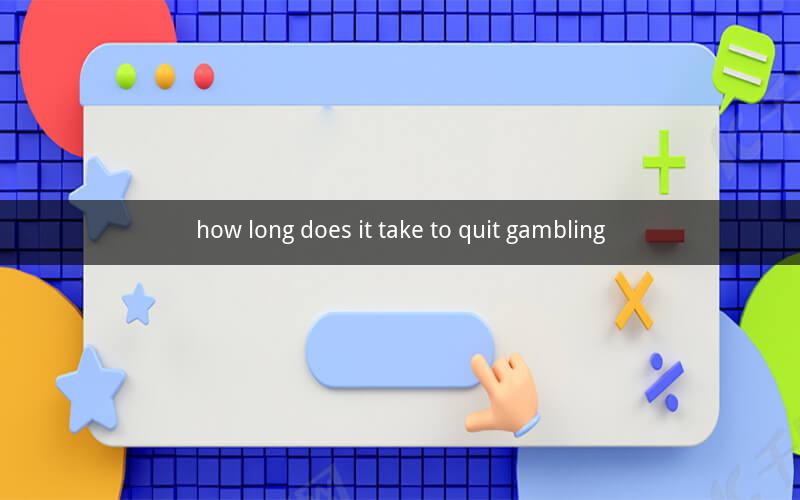
Table of Contents
1. Understanding the Concept of Gambling
2. The Importance of Identifying the Problem
3. Factors Influencing the Duration of Quitting Gambling
4. Strategies for Overcoming Gambling Addiction
5. Seeking Professional Help
6. The Role of Support Systems
7. The Process of Recovery
8. Coping with Relapse
9. The Long-Term Effects of Quitting Gambling
10. Personal Stories and Inspirations
1. Understanding the Concept of Gambling
Gambling is an activity that involves risking money or something of value on an event with an uncertain outcome. It can be found in various forms, such as lottery, sports betting, casino games, and online gambling. While many people engage in gambling for entertainment, it can lead to addiction if not managed properly.
2. The Importance of Identifying the Problem
Recognizing that gambling has become a problem is the first step towards quitting. Signs of a gambling addiction include chasing losses, borrowing money to gamble, lying to hide gambling activities, and feeling restless or irritable when unable to gamble.
3. Factors Influencing the Duration of Quitting Gambling
The duration it takes to quit gambling varies for each individual. Some factors that influence this process include the severity of the addiction, the individual's support system, the presence of underlying mental health issues, and the availability of treatment options.
4. Strategies for Overcoming Gambling Addiction
There are several strategies that can help individuals overcome gambling addiction. These include:
- Setting a quit date: Picking a specific date to quit gambling can help individuals stay focused and committed to their goal.
- Avoiding triggers: Identifying and avoiding situations that may trigger gambling cravings is crucial.
- Developing healthy coping mechanisms: Engaging in activities such as exercise, hobbies, and socializing can help individuals manage their cravings.
- Creating a support network: Connecting with friends, family, or support groups can provide emotional support and guidance during the recovery process.
5. Seeking Professional Help
Professional help can be invaluable in overcoming gambling addiction. Therapists, counselors, and psychologists can provide personalized treatment plans tailored to the individual's needs. Treatment options may include cognitive-behavioral therapy, medication, and group therapy.
6. The Role of Support Systems
Support systems play a crucial role in the recovery process. Friends, family, and support groups can offer emotional support, encouragement, and accountability. Joining a support group, such as Gamblers Anonymous, can provide individuals with a sense of community and shared experiences.
7. The Process of Recovery
The process of recovery from gambling addiction is a long-term endeavor. It involves several stages, including:
- Denial: The individual may deny that they have a problem with gambling.
- Acceptance: The individual acknowledges that they have a gambling addiction and seeks help.
- Treatment: Engaging in various treatment options to overcome the addiction.
- Relapse prevention: Developing strategies to prevent relapse and maintain long-term recovery.
- Maintenance: Continuing to work on personal growth and maintaining a healthy lifestyle.
8. Coping with Relapse
Relapse is a common occurrence in the recovery process. It is essential to view relapse as a learning opportunity rather than a failure. Learning from relapse and seeking additional support can help individuals overcome the setback and continue their journey towards recovery.
9. The Long-Term Effects of Quitting Gambling
Quitting gambling can have numerous long-term benefits, including improved financial stability, better mental and physical health, and stronger relationships with loved ones. It is essential to maintain a healthy lifestyle and continue working on personal growth to ensure long-term success.
10. Personal Stories and Inspirations
Personal stories and inspirations from individuals who have successfully quit gambling can provide motivation and hope for others struggling with the addiction. These stories often highlight the challenges faced during the recovery process and the importance of perseverance and support.
FAQs
1. How long does it take to quit gambling?
The duration it takes to quit gambling varies for each individual, ranging from a few weeks to several years.
2. Can I quit gambling on my own?
It is possible to quit gambling on your own, but seeking professional help and support systems can significantly increase your chances of success.
3. Are there any medications to help with gambling addiction?
Yes, certain medications, such as naltrexone and topiramate, have been shown to help reduce gambling cravings and improve recovery outcomes.
4. How can I avoid relapse?
Developing healthy coping mechanisms, maintaining a support system, and seeking professional help can help prevent relapse.
5. Can gambling addiction be cured?
While there is no permanent cure for gambling addiction, it can be effectively managed through treatment and ongoing support.
6. What should I do if I suspect a loved one has a gambling addiction?
Encourage them to seek professional help, offer support, and educate yourself about gambling addiction to better understand and assist your loved one.
7. Is there a difference between problem gambling and gambling addiction?
Yes, problem gambling is a mild form of gambling addiction, while gambling addiction is a more severe condition that requires professional treatment.
8. Can gambling addiction affect my relationships?
Yes, gambling addiction can strain relationships with family, friends, and colleagues. Building a support system can help improve these relationships.
9. Is it normal to experience cravings during the recovery process?
Yes, experiencing cravings during the recovery process is normal. Learning to manage these cravings is an essential part of the recovery journey.
10. Can quitting gambling improve my financial situation?
Yes, quitting gambling can significantly improve your financial situation by reducing debt and enabling you to save money.